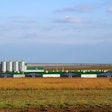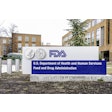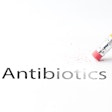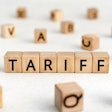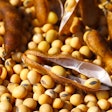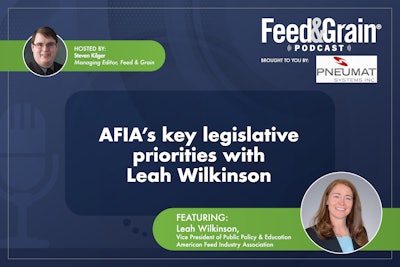
View on Zencastr
In this episode of the Feed & Grain Podcast, host Steven Kilger sits down with Leah Wilkinson, Vice President of Public Policy & Education at the American Feed Industry Association (AFIA), to discuss the AFIA’s legislative priorities as we head into the election season. Leah shares insights on key industry issues, including the Innovative Feed Act, FDA ingredient regulation, sustainability initiatives, and the importance of securing the agricultural supply chain. They also delve into the Farm Bill, formaldehyde regulation, and how the 2024 elections might shape the legislative landscape for the feed and grain industry.
Steven Kilger
Hello! My name is Steven Kilger, I’m the Managing Editor for Feed & Grain Magazine and the host of the Feed Grain Podcast. Thank you so much for joining me today as we dive deep into the issues affecting the Feed Manufacturing, Grain Handling, and allied industries.
Today’s episode is brought to you by The BinWhip from Pneumat Systems. The powerful Dual Impact BinWhip removes the toughest buildup and blockages in industrial storage silos – without hazardous silo entry. Learn more today at binwhip.com.
Today I’m talking to Leah Wilkinson, vice president of Public Policy & Education at the American Feed Industry Association. We’re discussing AFIA’s legislative priorities going into the election season, where industry advocates might want to focus, and the upcoming election season.
I hope you enjoy the interview, if you want to help with the podcast and are listening to this in a podcasting app, please rate us and subscribe! If you’re listening online, sign up for the Feed & Grain Newsletter Industry Watch to see when new podcasts drop and stay up to date with all the news from around the industry.
Now onto the show.
Hi Leah, thanks so much for joining me today.
Leah Wilkinson
Thank you for having me and being able to talk about some of the American Feed Industry Association priorities that we're working for in Washington, D.C.
Kilger
We were just talking before we started recording about how this has been a crazy summer. There's so much going on, so much happening. It's really important, I think, that everyone kind of gets an update and can get their head around everything that might affect their jobs going forward.
Wilkinson
And what we talk about today might change tomorrow, so we'll have to talk again more frequently too.
Kilger
Yeah, hopefully, we can have you on again soon, and hopefully, anytime you want to come on, just let me know and we'll be happy to have you.
Wilkinson
Sounds good.
Kilger
I have been lucky enough to know you for pretty much my entire career in the feed industry and we get to talk at, you know, trade shows and all these other things.
But for anyone who might not know who you are, can you tell us a little bit about yourself and of course your time at the American Feed Industry Association?
Wilkinson
Yeah, so I’m Leah Wilkinson, I'm vice president of public policy and education for the American Feed Industry Association and AFIA is a Trade Association based outside of Washington DC, we represent the total feed industry.
So that means we have member companies that manufacture feed, pet food, all of the ingredients that you could think of that we use in feeds and pet foods, and then the equipment that we use to make all of our products and other allied industries. As an association, we work on behalf of those members representing them at the federal and state levels in legislative and regulatory affairs, making sure that those companies can continue to do business and be able to provide safe, nutritious, high-quality quality, and sustainable products that our customers are expecting from us and we can continue to feed the world.
I've been doing this job now with AFIA for 14 years and have the pleasure of being able to work on behalf of the membership in those areas I specifically kind of focus on our ingredient areas and making sure the ingredient approval processes work. I work in the feed regulatory arena both at the state and federal level, handle our work on Capitol Hill, And then I get to focus in on aquaculture as well for our aquaculture committee. So that's kind of a little bit about what I do for AFIA.
I grew up in the pork industry in southern Minnesota and I'm the only one to move more than 10 miles away from my family. And so I like to still stay connected to them in Minnesota and their pork operation as much as I can.
Kilger
Yeah, well I'm sure they're waiting for you to come back.
Minnesota doesn't let people go easily.
Wilkinson
Very much so and my family's really strong and luckily we have technology that makes it a whole lot easier to stay connected than when I first moved away.
Kilger
Well, very true, and that's the only really good thing that came out of the pandemic is the explosion in communication technology. But, well, what we have you here to talk about today is kind of just the legislative priorities that you have at AFIA. Especially with, I don't know if people are aware out there, it's an election year, so some things might be changing soon.
But I thought we would just kind of go through kind of the list of what you guys are really working on starting with the Innovative Feed Act and the FDA's regulation of animal food ingredients. Can you talk a little bit about why you guys are trying to get that modernized what it's like now and what you're hoping it's going to be like once this is fixed?
Wilkinson
Absolutely, so every year our committees and our board of directors help guide the policy priorities for the association and one of the areas that we've been focusing on in the last 10-plus years is making sure that the ingredient review processes that we have in the United States work very efficiently and predictable for our membership.
We have such innovative technologies coming down the pike and companies that want to bring new products into the United States and to our customers. But we've been really hampered by getting things through our ingredient review processes here in the United States. And that's going back to resource issues that we had at the FDA.
They just, you know, did not have dedicated people to look at animal food ingredients.
So we've helped tackle that with them by getting them funding in the last several years to hire people.
They've reorganized themselves. But one of the biggest challenges that was remaining Was this whole category of products that go beyond providing taste, nutrition, or aroma. That's what we typically have as food ingredients.
That's what classifies them as food under the Food Dragon Cosmetic Act it provides taste, nutrition, or aroma. And so these products don't necessarily do that. So they're non-nutritive. They have other benefits beyond taste, nutrition, or aroma.
The way the FDA was classifying those products was pushing them into the animal drug category. And so it's tedious to get a feed ingredient approved, but it's really tedious to get an animal drug approved as it should be. We as AFIA thought that was an inappropriate determination for where these products should go because they really act within the digestive tract of the animal.
They are a feed ingredient. They're not animal drugs so could we get them regulated appropriately? So AFIA asked the FDA back in 2020 to relook at that policy that they had in place for decades. It took them a couple of years to look and Inwardly think about their policy and as they've been coming forward in this era of trying to provide innovation and pathways for innovation, they identified this as something that they would like to change and adapt as well.
So since we asked them here recently in this year, like you said, it's a year of change.
We've been working with Congress on the Innovative Feed Act to get FDA-specific legislative authority to regulate these products as food additives, which means they would go through the food additive petition pathway. And FDA rescinded that policy memo that they had in place. So products can start to go through the FDA now, not as a drug, or they're providing them some exemptions from the drug pathway. Until we get the Innovative Feed Act.
And so it's really the genesis from this is really so that we can be able to get products into the hands of producers that would help them with human food safety issues to be able to help on environmental issues. So think of methane reduction, other greenhouse gas reductions, anything from Less nitrogen or phosphorus being emitted from the animal's excrement.
Those types of things, you know, we right now we have products out in the market that do those things but they're not able to say they do those things and so this would open a pathway for those claims to be made on a product so that a producer would know that the product is safe, that A government agency has looked to make sure that they do what they say they're going to do.
So if they're spending the money on it, they know that it's going to do it. And then it opens up a producer to be able to capture either carbon credits or other government programs and cost Implementing measures like that to get some of that money back on their investment for doing the right thing, right? Specifically, if you're thinking of the environment.
So the key to it though is really trying to get that legislative authority for FDA through the Innovative Feed Act. So, we have that pathway.
Kilger
What was it? Taste, nutrition, or aroma?
Wilkinson
Yep, that's what classifies things as food right now. So, the Food Dragon Cosmetic Act is about taste, nutrition, aroma, food for man or animals, and chewing gum. That's what classifies as a food.
Kilger
Wow, it's sometimes our government, right? It's like if you asked an alien what food was, it would come up with that answer. Taste, nutrition, or aroma.
Well speaking of you know reducing emissions which as an industry in general we are just you know we're doing a lot more over I mean sustainability has been a hot topic issue for years now we're trying more and more so things like that seem really important and it will really be nice if the government you know It gets the headlines, that's for sure.
Wilkinson
So our members knew that we were falling behind the rest of the world, right?
They were able to market these products in the rest of the world and our livestock producers around the world were able to have access to feed ingredients that could help make these claims and help reduce the methane emissions from cattle specifically.
Tied with the Innovative Feed Act, while we need that act to be able to bring these products to market, we're also looking forward to what is needed in place so that producers, once they have products on the market, will be able to Capture the cost share dollars or through conservation programs and that kind of thing and that's what the Umentless Act is looking to do.
So it is a bill that would help focus some of our research priorities on methane reduction in the US government. It would look to the conservation programs to make sure that it's explicitly authorized for the payments to be given to producers if they utilize these types of products, these feed ingredients that can reduce methane just to help cover some of that cost for a producer and so it's really focused in this bill to kind of taking Those new ingredients and bringing them forward to producers so that they can be in their hands and help implement to know that they work and that they can capture some of that conservation program money in the future.
Wilkinson
So we're trying to be forward-thinking as well as knowing we need new regulations.
Kilger
Well, yeah, I mean, forward-thinking is what we're trying to do right now as an industry in general, right?
Really important that we figure all these things out and that's why it's great to have kind of an organization like AFIA which I feel is a kind of model of what an industry organization should be an industry association should be you are there for other you're there for the industry you're lobbying you have the connections you're doing all this so hopefully we get some more movement on here and you'll be able to tell me to come back and talk about when we these things actually get I look forward to that day.
Wilkinson
It is, Stephen, but I'm excited because I think we finally have made some progress on these issues and have some traction, right? We have great bipartisan sponsorship for the Innovative Feed Act, for the Emit Less, and some other things we're going to talk about.
That's hard to come by in today's political environment in Washington DC, but I think it's a testament to the membership that we have as well as the issues that we have, right? And we're able to find that bipartisan support and hopefully it will come through for us in the end.
Kilger
Yeah, well, other than the Farm Bureau, it seems like agriculture is still one of the things that we can get Congress to agree on, both sides. So hopefully we have some chance of them, you know, getting moving forward with these. So, the next one we have on here is the FDA's Center for Veterinary Medicine and how you're advocating for additional resources to be brought to the center, obviously. Can you tell me a little bit about what those additional resources could do and help with the feed industry?
Wilkinson
So it's not often that you have a regulated industry asking for more regulators, right? But as I indicated earlier, this is really focused on the ingredient review. Staff and their efforts within FDA and we want to make sure that they are properly resourced so that we don't have a pile-up of ingredient submissions sitting there and that is the barrier to bringing these products to market.
And so being able to have that staff be fully staffed, fully operating at the having proper technology, right, to even work together. So they're not all sitting in the same office anymore like they were prior to COVID. So how are they communicating with each other, you know, being able to take electronic submissions and all of those things is what these resources help go to. We were able to get money with Congress appropriated in the last five years.
They've gotten about $6 million to hire staff and that has helped tremendously. Conversations that we had with the FDA Center for Veterinary Medicine last week just talked about how much better they are at hitting their milestones for reviews. And so they are, they're getting through their reviews in a timely manner. They're not maybe all getting to the yeses that we want right away, right? They do still have questions, but they are meeting their timelines and that's great.
But we know that with the Innovative Feed Act, And, you know, some of these other changes they still need to have a few more resources. So we're just keeping the attention there that we definitely don't want their staffing to be cut as we talk about the budget situation. And so we want to at least maintain what they have, if not grow if we possibly can. So that's really what we're focusing in on, on that work there on Capitol Hill.
Kilger
Yeah, I mean, it sounds great, right? You don't have any regulators, but also when you just have a few of them, they don't move very quickly.
Wilkinson
Exactly. And they're tasked to do multiple things. And so now this group is really focused and, and it's definitely proving true that we've, we've made progress.
Kilger
Well, it's also nice to have, you know, an example of why this, works, right? Like, ah, we did it. We got more funding for them. Now it's working better. We're just going to need to make sure it doesn't fall behind again. It's nice to be in a position where we're preemptively trying to do something versus trying to catch up after the fact, which is not always easy to do with regulation. Almost never.
You talk a little bit about the Securing American Agriculture Act, especially how it might affect secure supply chains, which once again after COVID-19 is something that came to everyone's mind, right? We realized how very fragile these supply chains can be and what a disaster they could be if they get out of whack.
Wilkinson
Yeah, so another high priority for AFIA is making sure that we have access to the products that we need to manufacture our feeds and pet foods. And we know that we are dependent upon certain countries for if the majority of if not all of some of our ingredients and we're thinking you know vitamins here is one example amino acids as another and so we're vulnerable in that area right and wanting to make sure that we have We have done everything that we can do from the United States to minimize that risk as much as possible.
So can we look at diversification? Are there things that we can do here in the United States that would help us be able to manufacture more of these products that we have gotten away from manufacturing in the United States? Those types of things. And so the Securing American Agriculture Act is another one of these where we were up talking to Congress and they said, well, hey, let's, you know, let's work on this.
And we were able to get Representative Hinson from Iowa, who was really spearheading the effort. And that bill specifically is looking at having the Department of Agriculture do a report and look at our agriculture supply chain. And so it's broad, but it includes feed and these feed ingredients. To see where our vulnerabilities are specific to if we need to diversify our supply chains and then provide some recommendations. And so we've got the bill introduced in the House of Representatives. We're working on getting a companion bill introduced in the Senate. And this is something that could you know get attached to the farm bill or to another piece of legislation that would just help raise the awareness and help drive other programs then in the future for us to find ways to mitigate and hopefully then we are De-risking the system I think is the new word that we can use around that so we can continue to provide those products to our livestock and pet customers.
Kilger
That's the one thing, right? Like the food supply chain. That's what we can all agree about that we need to have a lockout in case anything happens. So it's good that Congress is taking this seriously because, well, we all know it takes a really long time to recover from any kind of downturn like this and any kind of operational thing.
Wilkinson
Yeah, and we had a little bit of it with COVID, right? And so we're just trying to prevent that from happening again. And it's definitely, it is definitely a food security issue for sure.
Kilger
Well, yeah, I mean, I remember stories with, well, it was a lot of like on the slaughtering side and things like that. But the moment those meat prices rise, people really start to care about the animal agriculture supply chain, don't they?
Wilkinson
Yes, yes.
Kilger
Well, let's talk about something near dear to my heart, formaldehyde. It's a scary word. I think that's a lot of the reason people are against it. But can you talk a little bit about EPA's recent review of formaldehyde and, of course, how the Sound Science for Farmers Act addresses kind of their negative viewpoint of it?
Wilkinson
Many people, Stephen probably listening, don't have any idea that we use formaldehyde in animal feed and that we have.
Kilger
Guilty myself until a few months ago.
Wilkinson
Yeah, we educated you, right?
Kilger
You did, yep.
Wilkinson
So we've used it safely for over 40 years. Right now formaldehyde is approved as a Chemical medicine for us to be able to reduce foodborne pathogens in feed and therefore make the livestock and those livestock products safer for you and me to eat.
So specifically, salmonella in poultry and swine diets, and then it's used across agriculture and other applications for animal health and food safety reasons as well. EPA has been reviewing it for its exposure to humans and potential for cancer risk. And that reassessment that they call it, there are three different reports and reassessments that are going on within the Environmental Protection Agency.
That's been going on and, you know, they're trying to really get something done here before the potential change in the administration. And part of it is making sure that EPA knows that This product is used in animal agriculture, in animal feed why it's so important, and what happens to us if we don't have access to it, right?
Wilkinson
We don't have any alternatives that are, you know, necessarily as usable. But it's not only that, it's just making sure that EPA is following their science. That's what really we're focused on. Making sure they're working across the agencies and consulting with USDA and the Food and Drug Administration and that they are following all of their processes and procedures within EPA as they do this those reassessments.
And so that's what the Sound Science Performers Act is kind of looking at is, you know, specifically stating that they have to work across those agencies in the interagency review and providing timelines for doing that and making sure that they're following procedures and considering agriculture in the impacts that the agency is taking. So it's really just driving home that, hey, don't forget about us, these things are important and do your job.
Kilger
Yeah, we know it's a scary word. Yeah, it's important still. I wrote a blog recently about formaldehyde use in feed because I wasn't aware that it was used so often in Feed manufacturing. So it was a little something once I heard from you guys, I went out and educated myself out and then like, oh yeah, we really do need this.
Wilkinson
Yeah. We appreciate your help and spread the word you could take formaldehyde out of this sentence and plug in another ingredient and AFIA would be doing the same thing, right?
Because it's really about making sure that the government's doing its job thoroughly reviewing it based on science. And so we just want to make sure that All of those considerations happen appropriately before they take action on a product.
Kilger
Yeah, of course, definitely. So there's, you know, the elephant in the room when it comes to ag legislation this year, and that's the Farm Bill. What programs does AFIA want to see Included in the Farm Bill, hopefully this year, worst case scenario, early next year? And how do they support the animal feed industry?
Wilkinson
So the basis of the Farm Bill is making sure that all of our animal agriculture and agriculture, in general, continues to have the programs that they need, whether it's research, Whether it's the feeding programs that we have for Americans, the conservation programs, the commodity programs, right, all of that is there to make sure that we continue to have a strong agricultural industry here in the United States.
And that's really the foundation of why AFIA is advocating across with the rest of agriculture, right, for getting a farm bill done. As soon as possible, it's just making sure that those farmers and ranchers have the confidence that the programs are there if they need them and that we will continue to have animals that we can feed, right?
And that you and I then have products to eat that we so like to, you know, I'd love to have my bacon and eggs in the morning, right?
And so, you know, there are specific things within the Farm Bill that get reauthorized every what's supposed to be every five years. And AFIA is looking at specifically we've been long supporters of growing the research programs for research across agriculture but specifically for animal agriculture and wanting to make sure that investment is there so we can remain globally competitive.
The conservation programs are a new area for AFIA because of our work with the Innovative Feed Act and the Emit Less Act that's out there. So we just want to make sure that there's nothing in there that would prohibit those types of products or any conservation programs that would limit Any dollars that could go to livestock producers if they utilize those specific technologies or animal feeding nutrition standards in general.
That's there and we're trying to bolster that work with USDA as well.
Then the other part we really haven't talked about much is our abilities to grow our global competitiveness because of our exports and so there are programs within the farm bill that provide monies for market access and foreign market development and AFIA is a cooperator with USDA and receives some of those program dollars to help us grow Our ability to export more products outside of the United States, right?
And those program dollars haven't grown in quite some time and so with inflation and all of that, you know, The size of the pie has remained the same but we have more cooperators in there going for the same money, and really just looking to try to broaden out those dollars so that we can continue to do and provide programming to grow our export markets because we're running in a trade deficit right now and we'd like to see that flipped.
Kilger
But yeah, and I mean, the US has the capacity, right? We could do it. We could supply more and more. We just need to have markets for our product.
Wilkinson
Absolutely. And we know that there are countries that are looking for US products, right? And so how can we help facilitate that? We've got different programs that AFIA is working on in Vietnam, Brazil for example. So, those are growing markets for us and we want to be able to continue to help capture some of that return for the industry.
Kilger
Yeah, yeah definitely. Well hopefully we get some news on it and it moves forward soon. Fingers crossed, fingers crossed on the farm bill. That's always my motto when it comes, every five years when it comes to a farm bill.
Wilkinson
Exactly. And as you mentioned, this is one that should be bipartisan, right? And so we'll see what happens here in the next couple of months. See if they get it done. Otherwise, it's going to get punted until the new Congress and then we'll have new leadership and hopefully, we can get it done then.
Kilger
Yeah, hopefully. I have confidence. It'll get done eventually. It's just all about the timeline.
Wilkinson
Exactly.
Kilger
So is there anything else that feed members should know that we haven't covered here that you guys are working on? I know it's been a hectic summer. We talked about it even in a couple of weeks since we chatted last. It's changed a lot.
Wilkinson
So we do have some changes coming in our ingredient reviews. We had the FDA Center for Veterinary Medicine had been working with the Association of American Feed Control Officials through a memorandum of understanding for reviewing those AFCO ingredient definitions and the FDA has announced in AFCO that they're going to stop doing that cooperative effort and
FDA just recently opened up some comment periods for their proposed replacement for it so we've got to look at their new proposals And provide some comments in the next couple of weeks back to the agency and then they're also doing a deeper dive into all of their ingredient review systems and so we've got an opportunity to provide some good feedback to the Center for Veterinary Medicine on what will really work well for our industry and so we're going to be busy writing comments here in the next couple months and We'll have some good things to talk about with you in the future on those
comments.
Kilger
Well, it'll be a busy late summer, and early fall, huh?
Wilkinson
Oh yes, I know what I'll be working on.
Kilger
Well, that sounds great and we'll cover that news as it comes out because that was a big shock, that cancellation of the memorandum. I thought that took most of us by surprise.
Wilkinson
We kind of saw it was coming and so I think now you know we've been I'm trying to make some good lemonade out of the lemons that we've been dealt with and hopefully we can get even better review systems for the animal food industry out of this in the end.
Kilger
That's the best way to handle it, make that lemonade. So I mean I feel like I lose my license as a journalist that I don't have, but you know, I feel like if I didn't have you on it, I didn't ask you about the 2024 election and how it might shape the legislative landscape for the industry. What are you guys kind of following when it comes to, you know, this presidential and congressional and senatorial campaign?
Wilkinson
Well, It's been an exciting year so far with everything. I will guarantee you it's not going to get any less exciting for the rest of the year, but that's for sure with the elections coming. I think as everybody knows, an even-numbered year is an election year. This time's up with our presidential election that's happening too. There was really the focus of, you know, how much is going to get done and when is it going to get done? And that's where things have really been looking at on Capitol Hill. And so I think, you know, it's very few working days left before.
Well, once they come back from August recess, there'll be very few days before they go back out to campaign before the November elections. There are things that have to be done by September 30th, right? Funding the government is one of those and so do they do individual bills? Do they make a continuing resolution to fund it for a short period of time and then come back after the elections?
And so I really think that post-election time, Steven, is when we can look forward to some of these things hopefully being That will make some exciting IPPE sessions, won't it?
Kilger
Well, thank you so much for joining me today, Leah. For anyone who wants more information on what AFIA has going on, maybe wants to join, maybe wants to get involved, where should they go?
Wilkinson
Go check out our website, so afia.org, and if you want more information about these different priorities that I've spoken about today, you can check out our advocacy center. We've got a label there for legislative priorities. And then, as you said, we always are looking for more members, so go check out the membership button and see all that we can provide for you as a member.
Kilger
Yeah, I recommend, you know, checking out their blogs, and getting information there. It's, at least for me, it's been very good as a fan of the content that you guys produce. It's a really great resource just to check out this website, even if you aren't a member. Well, that's all I have for today. Thank you so much for joining me today, Leah. Really appreciate you stopping by. Hopefully, we can have you on again soon.
Wilkinson
Thank you, Steven. And you know that we're always here for you.
Kilger
That you are, you got me out of many jams so I appreciate it. Well everyone, until next time, stay safe out there.
.jpg?auto=format%2Ccompress&crop=faces&fit=crop&h=48&q=70&w=48)






